
THE VOICE OF INTERNATIONAL LITHUANIA
|
VilNews has its own Google archive! Type a word in the above search box to find any article.
You can also follow us on Facebook. We have two different pages. Click to open and join.
|
News
First-time event in Chicago this Sunday, April 15, to address lingering issues affecting Lithuanian-Jewish relations
- Posted by - (24) Comment
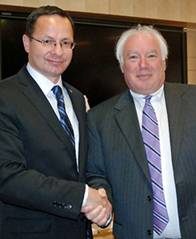
Zygimantas Pavilionis, Lithuanian ambassador to the U.S. (left), and Harley Felstein of the Lithuanian Heritage Project
Organizer: The Sunflower Project: A Jewish Lithuanian Heritage Project
Harley Felstein, project founder
Where: The Hyatt Lodge, 2815 Jorie Blvd., Oak Brook, Illinois 60523
When: 8-9 a.m. Sunday, April 15, 2012
Top-level individuals representing the Lithuanian government, Lithuanian-American groups, and members of the Jewish community, will be gathering for the first time in Chicago in an effort to begin to address lingering issues affecting Lithuanian-Jewish relations. The meeting is the second of its kind nationally -- the first was in Washington in the fall. The gatherings are the initial stages of an exciting new endeavor, the Sunflower Project, a Jewish Lithuanian Heritage Project, recently established as a means to reconnect Lithuanian Jews and their descendants in the Diaspora to their Lithuanian roots, support a revival of Jewish history and culture in Lithuania, further awareness of these efforts, and foster positive interest in Lithuanian Jews and Lithuania among American Jews. Ultimately, the Sunflower Project seeks to transform and positively influence the nature of Lithuanian-Jewish relations.
The Lithuanian Embassy in the U.S. and Consular officials as well as Harley Felstein, the founder of the Sunflower Project, have initiated many cultural activities already this year and have plans for in coming months.
Attendees will include, among others:
- 17 honorary consuls to Lithuania from across North America.
- Lithuanian Ambassador to the United States Zygimantas Pavilionis
- Lithuanian Ambassador to Canada
- Lithuanian consulate generals in Mexico City, New York, and Chicago
- Michael Kotzin, Senior Counselor to the President of the Jewish Federation of Metropolitan Chicago
- Steve Dishler, Jewish Community Relations Council of Chicago’s
- Director of International Affairs AJC Chicago Director Dan Elbaum
- Eugene Steingold, a Chicago lawyer born in Vilnius
- Alexander Domanskis, who is affiliated with the Lithuanian Foundation based in Chicago
- Stanley Balzekas, Jr., President and Founder of the Balzekas Museum of Lithuanian Culture in Chicago; board member of the Lithuanian American Council
- Harley Felstein, Sunflower Project founder, based in Washington
Contact: Samantha Friedman, Rabinowitz/Dorf Communications
(202) 265-3000; (202) 215-9260 (c); samantha@rabinowitz-dorf.com
- Bookmark :
- Digg
- del.icio.us
- Stumbleupon
- Redit it
The paperback of “Between Shades of Gray” has made the New York Times Best Seller list. HOORAY!!!!
- Posted by - (0) Comment

Between Shades of Gray was originally intended as a young adult novel, but there have been several adult publications. In an interview with Thirst for Fiction, Ruta Sepetys said that the reason she intended Between Shades of Gray to be a young adult novel was because she met many survivors in Lithuania who were themselves teenagers during the deportations, and had a greater will to live than many of their adult counterparts at the time.
- Bookmark :
- Digg
- del.icio.us
- Stumbleupon
- Redit it
![]()

The RMS Titanic sank one-hundred years ago, and has remained a fixture of curiosity and study ever since. Over the last century oceanography has advanced a great deal, and several research expeditions have gone down to the wreck to study it, sometimes managing to bring items back up from the depths. Last week, one such story broke about a rare Lithuanian book being salvaged from the shipwreck. Lithuanians on the Titanic? Indeed.
Juozas Montvila was born in Gudinė in 1885 and ordained in 1908, became a vicar in Lipskas, but was caught ministering to the Uniates, a religious group “proscribed” by Czarist Russia. His sentence removed his vicarage and forbade him from becoming a pastor. He wrote and illustrated for several newspapers in Vilnius. An appeal to the sentence was not forthcoming, so he prepared to emigrate to the United States, where he had family, so that he could resume his pastoral calling. He traveled to England and from there boarded the Titanic and stayed with the Second Class passengers. After the ship struck the iceberg, Montvila, along with two other Catholic priests, stayed on board to console doomed passengers who couldn't make it to the life boats. Montvila was 27 in 1912.
- Bookmark :
- Digg
- del.icio.us
- Stumbleupon
- Redit it
- Posted by - (0) Comment
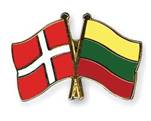
____________________________
COWI to open IT service centre in Vilnius

____________________________
Denmark's Nielsen & Nielsen to hire 40 finance professionals in Kaunas
- Bookmark :
- Digg
- del.icio.us
- Stumbleupon
- Redit it
Russia deploys S-400 missiles in Kaliningrad
- Posted by - (0) Comment
![]()

A Russian newspaper has reported that the military has begun deploying S-400 mobile surface-to-air missiles in Kaliningrad, the Baltic exclave bordered by Poland and Lithuania.
Izvestia cited unnamed military officials as saying the missiles arrived Friday, but did not say how many. The Defense Ministry declined comment on the report.
S-400s, Russia’s most advanced surface-to-air missiles, have a range of 120-400 kilometers (75-250 miles).
The report comes amid rising tension between the U.S. and Russia over Washington’s plans for a missile-shield system in Europe, which Russia contends threatens its own defenses.
- Bookmark :
- Digg
- del.icio.us
- Stumbleupon
- Redit it
Lithuania approves Jewish compensation
- Posted by - (0) Comment
![]()

Lithuania on Wednesday approved a special fund to manage compensation for Jewish property seized by Nazi Germany during World War II and then kept by the Soviet regime.
"This is a very important decision after 15 years of discussions" between the government and the Jewish community, Prime Minister Andrius Kubilius told reporters.
The move allows the distribution of 128 million litas (37 million euros, $49 million), which the Baltic state pledged to earmark in 2013-2023 under a law adopted last year.
"Such decisions are important for all of us, for historic justice, and we have made a big step in realizing our moral responsibility towards history, sometimes difficult and tragic history," said Kubilius.
- Bookmark :
- Digg
- del.icio.us
- Stumbleupon
- Redit it
![]()
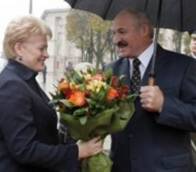
D. Grybauskaitė and A. Lukashenka
Belarusians and Lithuanians have a long common history which started long before the Grand Duchy of Lithuania 500 years ago. Two nations followed clearly divergent paths only after the collapse of the Soviet Union. When Lukashenka came to power, he recognised the state border of Lithuania and thus prevented the main source of possible tension between two countries.
Lithuania hosts many Belarusian exile organisations including the European Humanities University but remains cautious about economic sanctions. It supports liberalisation of visa regime for Belarusians but was guilty of leaking information to Belarusian authorities which led to imprisonment of human rights activist Ales’ Bialiatski. Two countries cannot agree on several issues, including Belarusian nuclear power plant, but overall their relations remain remarkably pragmatic.
History of Peaceful Coexistence
For more than a half of millennium, Belarusian and Lithuanian people have peacefully lived together in the Grand Duchy of Lithuania and the Polish-Lithuanian Commonwealth. This experience of coexistence continued after the Russian Empire had annexed their lands, with many Belarusians studied at the Vilnius University.
- Bookmark :
- Digg
- del.icio.us
- Stumbleupon
- Redit it
Abducted Pennsylvania girl kept away from school, doctors during 5 years in Thailand, with fake Lithuanian passport, prosecutor says
- Posted by - (0) Comment
![]()

Abducted Pennsylvania girl kept away from school, doctors during 5 years in Thailand, with fake Lithuanian passport, prosecutor says
Deonna Shipman should be in the third grade reading books and learning about bugs.
Instead, during the five years she lived with her father in Thailand under a fake name and with a false Lithuanian passport, the 8-year-old attended school for just one week and never saw a doctor or a dentist, according to Assistant U.S. Attorney Lisa Fletcher.
Deonna, who was 3 when she and her father disappeared from Salina in northern Westmoreland County,
Pennsylvania, in July 2007, told a child protective worker that she can spell her first name but not her middle or last names, Fletcher said.
Jeffery Shipman, 51, formerly of Clay, has pleaded not guilty to international parental kidnapping for abducting his daughter. U.S. Magistrate Judge David Peebles ruled Monday that Shipman should be held in custody until his trial.
Jeffery and his ex-wife, Lioubov Shipman, were involved in a bitter custody battle over Deonna when Jeffery Shipman left the country with the girl. Authorities tracked Shipman from Rochester to London, where the trail went cold. Their whereabouts were unknown until they walked into the U.S. Embassy in Bangkok on Feb. 24.
The girl also recalls being in Canada, France and England, Fletcher said Monday at Jeffery Shipman’s detention hearing.
Shipman and his daughter had fake Lithuanian passports, had “little means” and were looking over their shoulders, the prosecutor said.
- Bookmark :
- Digg
- del.icio.us
- Stumbleupon
- Redit it
- Posted by - (0) Comment
Siauliai air base, Lithuania:
German F-4 Phantom jet loses communications as it nears Finnish airspace, causes worries in NATO

Two German F-4 Phantom jet fighters under NATO control streaked off the runway at the Siauliai air base in Lithuania this week in response to a report that an aircraft had lost communications as it neared Finnish airspace.
It was all an exercise — a simulation — but one with a point beyond mere rehearsal: NATO officials hope that, at a summit in Chicago this May, member nations will put aside concerns over sovereignty and agree in principle to create joint defense capabilities.
- Bookmark :
- Digg
- del.icio.us
- Stumbleupon
- Redit it
European Commission’s proposed EU aid distribution principle does not satisfy Lithuania
- Posted by - (1) Comment
![]()
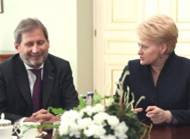
President Dalia Grybauskaitė met this week with EU Commissioner for Regional Policy, Johannes Hahn.
The meeting focused on the preparation for negotiations on the EU financial framework for the period 2014 - 2020 and the European Cohesion Policy.
According to the President, the principle of distribution of the EU aid, which has been proposed by the European Commission, does not satisfy Lithuania.
In distributing the EU aid, account should be taken of the interests and the level of development of each country, the President said. During negotiations, Lithuania will seek the review of the principles of distribution of structural aid.
- Bookmark :
- Digg
- del.icio.us
- Stumbleupon
- Redit it
Security centre will be established in Lithuania to combat nuclear smuggling
- Posted by - (0) Comment
![]()

At the Nuclear Security Summit held to address measures and initiatives for enhancing nuclear security, President Dalia Grybauskaitė introduced Lithuania’s practical contribution to combating nuclear smuggling, a centre of excellence for nuclear security.
At a Nuclear Security Summit held to address the measures and initiatives for enhancing nuclear security, President Dalia Grybauskaitė introduced Lithuania’s practical contribution to combating nuclear smuggling
Following and supporting the US initiative to create a network of centers of excellence for nuclear security, this year such center will be established in Lithuania. In cooperation with the United States and other partners, the Center of Excellence for Nuclear Security, to be set up at the Border Guard School in Medininkai, will provide training sessions, prepare exercises and interaction plans for combating nuclear smuggling, and promote interinstitutional contacts. This center is expected to become regional.
“Lithuania as a nuclear state which plans the construction of a new NPP and has spent fuel storage facilities perfectly understands the importance of securing nuclear materials from terrorists. Therefore, Lithuania will continue to contribute to the efforts of international community to ensure safe use of nuclear materials,” the President underlined.
Yukiya Amano, the Director General of the International Atomic Energy Agency (IAEA), during his meeting with the President officially promised his support in constructing and developing the Nuclear Security Center of Excellence in Lithuania. According to the President, it is an important sign of international confidence in Lithuania.
- Bookmark :
- Digg
- del.icio.us
- Stumbleupon
- Redit it
Pianist Agnė Radzevičiūtė of Vilnius to be a contestant at the Sixth New York International Piano Competition
- Posted by - (0) Comment
![]()

Agnė Radzevičiūtė
Photo: Tayla Nebesky
22 Young Pianists, Ages 16-21 Have Been Chosen From Across the Globe for Week-long Event at The Manhattan School of Music.
The Stecher and Horowitz Foundation of New York has announced the contestants who will compete at the Sixth New York International Piano Competition, which will be held at The Manhattan School of Music from Monday, June 18 through Friday, June 22, 2012.
Twenty-two pianists, ages 16-21, will gather from across the globe for the week-long event, which includes four rounds plus a series of masterclasses and seminars. Awards are also given to the best duo, paired at the beginning of the competition, to perform in the ensemble round.
Unique to the New York International Piano Competition is its policy of no elimination; each contestant will perform in all four rounds and be judged by a jury of some of the most distinguished members of the music community. Every participant will return home either as a prize winner or finalist award recipient. The level of competition has been uniformly high over the event’s 10 year history; former winners have gone on to win the Gilmore Young Artist Award, The Juilliard School’s William Petschek Recital Award, the Louis Sudler Prize in the Arts at Harvard University, the Young Concert Artists International Auditions, the 2010 Concert Artists Guild Victor Elmaleh Competition, and some to become National Foundation for Advancement in the Arts Presidential Scholars.
- Bookmark :
- Digg
- del.icio.us
- Stumbleupon
- Redit it
Eurozone problems do not leave anybody cold
- Posted by - (0) Comment
![]()
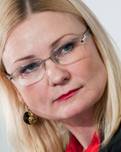
Rūta Vainienė
A survey of the Lithuanian economy conducted by the Lithuanian Free Market Institute (LFMI) shows that eurozone problems do not leave anybody cold. Lithuania failed to join the eurozone in 2007 because it missed the inflation criteria by only 0.06 per cent. At the time, it was considered a big political failure. However, given the present vulnerability of the eurozone, it may look like a windfall success. The national currency, the litas, is pegged to the euro under currency board arrangement, so the litas remains very closely linked to the euro.
- Bookmark :
- Digg
- del.icio.us
- Stumbleupon
- Redit it
New campus initiative – LCC International University in Klaipeda opens an Institute for Innovation Design.
- Posted by - (0) Comment
![]()

Eglė Songailienė and Vaidas Levickis, members of the Business Administration Faculty at LCC in Klaipeda.
LCC International University in Klaipeda has welcomed a new initiative on campus - the Institute for Innovation Design. The idea to launch this new project, which will contribute in transforming challenges into opportunities, was developed by Eglė Songailienė and Vaidas Levickis, members of Business Administration faculty.
The Institute will have a group of professional qualitative researchers, who will bring unique skills and competences to the project. Key activities of the Institute will include various researches and projects. The Institute will work with various organizations to help them better understand the needs and experiences of the people they serve and create innovative solutions.
The Institute will host 12 monthly sessions for leaders about the best innovation practices, the latest breakthrough ideas and transformative intellectual conversations in literature. It will also offer a summer internship program, which will provide students with unique hands-on work experience, in collaboration with faculty members.
The Institute for Innovation Design will not only work to help organizations better connect with the people they serve and design customer experiences with great value to business, but also offer new, creative initiatives for LCC students.
- Bookmark :
- Digg
- del.icio.us
- Stumbleupon
- Redit it
Drunk politician causes traffic accident, waives responsibility – so typical, so annoying…
- Posted by - (0) Comment
![]()
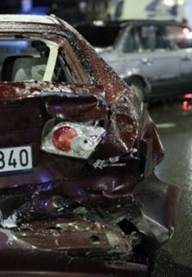
This week, the Lithuanian parliamentarian Vincas Babilius of the Liberal and Centre Union LiCS party caused a traffic accident while drunk, according to eyewitnesses.
The young man whose car was damaged in the accident, said that the member of the parliament seemed drunk and had offered him 25 thousand litas if he did not call the police.
After this, Mr. Babilius left the scene of the accident and went to hospital the next day.
Yet again a politician goes unpunished, writes www.diena.lt:
“Theoretically he could have waited for the police, paid the fine and – if he had been driving under the influence of alcohol – resigned his post as member of parliament. In practice, however, things have once again taken the usual course.
… If the victim of the accident is to be believed, the politician appeared to be drunk and offered him a large amount of money, which he refused. Then the parliamentarian dismantled his license plates and took a taxi home.
When the story came out the next day, Vincas Babilius was suddenly in hospital – for heart problems. So typical, so annoying,” writes the newspaper.

Vincas Babilius
- Bookmark :
- Digg
- del.icio.us
- Stumbleupon
- Redit it
LATEST NEWS FROM:
- Posted by - (0) Comment
![]()

THE BALTIC TIMES is an independent weekly newspaper that covers latest political, economic, business, and cultural events in Estonia, Latvia and Lithuania. Born of a merger between The Baltic Independent and The Baltic Observer in 1996, The Baltic Times brings comprehensive, and timely information to those with an interest in this rapidly developing area of the Baltic Sea region.
- Bookmark :
- Digg
- del.icio.us
- Stumbleupon
- Redit it
VilNews e-magazine is published in Vilnius, Lithuania. Editor-in-Chief: Mr. Aage Myhre. Inquires to the editors: editor@VilNews.com.
Code of Ethics: See Section 2 – about VilNews. VilNews is not responsible for content on external links/web pages.
HOW TO ADVERTISE IN VILNEWS.
All content is copyrighted © 2011. UAB ‘VilNews’.

 Click on the buttons to open and read each of VilNews' 18 sub-sections
Click on the buttons to open and read each of VilNews' 18 sub-sections 















.jpg)



